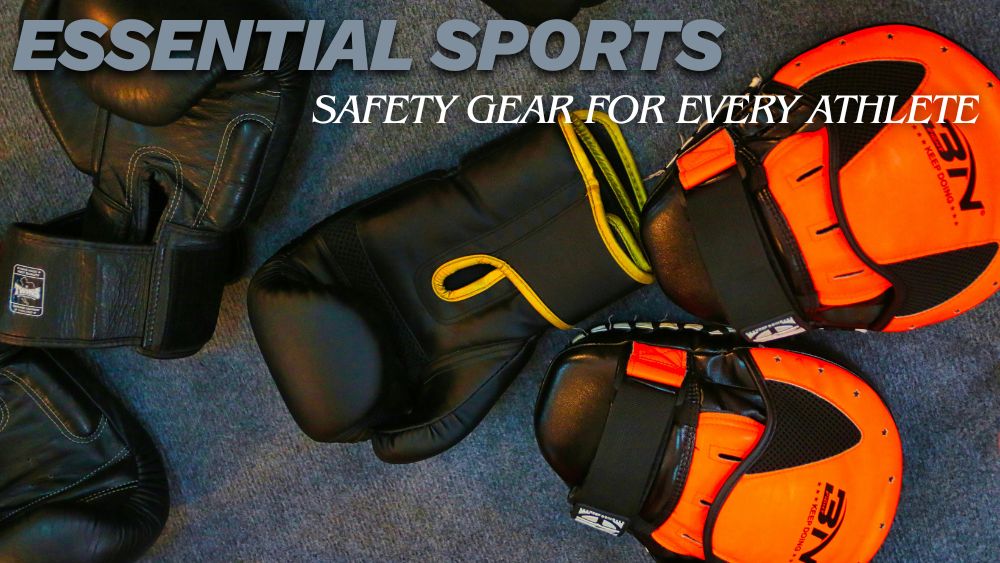Every athlete—beginner or pro—needs the right protection. Whether you're sprinting across a field, practicing martial arts, or training in a competitive sport, your body deserves support and defense. That’s why investing in sports safety gear is more important than ever.
Modern athletes push themselves harder, train longer, and participate in more intense activities. This makes athletic safety equipment a non-negotiable part of every routine. High-quality gear doesn’t just protect you—it boosts performance, builds confidence, and helps you play at your best.
If you’re looking for reliable, long-lasting, and performance-driven protection, explore this curated collection of sports protective gear here:
sports safety equipment
Let’s break down the athlete protection essentials every sports enthusiast should use in 2025.
Why Protective Gear Matters More Than Ever
Today’s sports culture encourages speed, competition, and progression. That’s powerful—but it also means higher risk. Without proper gear, athletes face strains, sprains, bruises, fractures, or long-term injuries.
Sports protective gear helps you:
-
Reduce injury risk
-
Train longer without discomfort
-
Build proper form
-
Improve balance and mobility
-
Increase confidence in high-intensity moments
From headgear to specialized padding, using the best sports safety gear 2025 can literally change the trajectory of your athletic journey.
1. Essential Sports Equipment Every Athlete Needs
Some gear forms the foundation of safe training regardless of sport. These are your must-haves—your daily protection partners.
Key essentials include:
-
Headgear or helmets
-
Mouthguards
-
Padded shorts and compression wear
-
Shin guards
-
Gloves
-
Supportive socks
-
Quality training bags
A great starting point is a durable ball designed for training safety and performance:

protective sports gear for beginners
This reliable piece helps athletes practice confidently while reducing impact-related risks.
2. Compression Gear for Muscle Support
Compression gear plays a major role in injury prevention and recovery. It stabilizes muscles, improves blood flow, and reduces strain during intense movement.
Compression shorts like these combine coverage, flexibility, and breathable comfort:
They help athletes maintain proper form and reduce the chance of muscle pulls or fatigue.
This makes compression gear a vital part of athlete protection essentials for runners, lifters, fighters, and field players.
3. Shin Guards: A Must-Have for Contact Sports
Shin injuries are extremely common in sports like soccer, hockey, martial arts, and field sports. A strong pair of shin guards can prevent bruises, fractures, and painful impacts.
Explore classic and protective shin guards here:
For extra reinforcement and better shock absorption, you can also try another advanced pair:
These provide full coverage while staying lightweight, making them ideal for beginners and advanced athletes.
4. High-Quality Socks for Comfort and Grip
It may surprise you, but reliable sports socks significantly influence performance. They reduce friction, prevent blisters, add cushioning, and offer much-needed stability.
A great pair like these performance-driven socks supports every step:
Socks are often overlooked but are key to maintaining foot health—especially during long training sessions.
5. Protective Gloves for Training and Competition
Hand protection is crucial for athletes in strength training, boxing, weightlifting, cycling, and field sports. Good gloves improve grip, reduce wrist strain, and protect your palms from high-impact stress.
These durable training gloves offer comfort and reinforced design for long-term performance:

protective gear recommendations
They help athletes maintain power and technique while reducing the risk of calluses and joint pain.
6. Sturdy Training Bags to Organize Your Gear
Staying organized is a huge part of staying safe. When all your equipment is clean, protected, and easy to carry, you train better and avoid gear-related mishaps.
A high-quality training bag like this one makes transporting equipment simple and secure:
Spacious, durable, and built for tough environments, it keeps all your essential sports equipment in one place.
7. Helmets and Head Protection for Serious Athletes
Head injuries are among the most dangerous in sports. Whether you're biking, skating, playing contact sports, or training in high-risk environments, headgear is non-negotiable.
A reliable helmet reduces impact force and protects against concussions. Check out this high-quality helmet combo for maximum safety:
If you prefer a standard protective version, this one offers all-around coverage and comfort:
Your brain is your most valuable asset—protect it with the right equipment.
8. Affordable Sports Protective Gear for Beginners
Beginners need gear that offers safety without overwhelming complexity. Affordable but reliable options help them build confidence while learning.
Beginner-friendly gear includes:
-
Lightweight shin guards
-
Starter helmets
-
Training gloves
-
Basic compression shorts
-
Performance socks
-
Standard training balls
This combination reduces risk while allowing new athletes to build good habits early.
Looking for budget-friendly options? Browse here:
affordable sports protective gear
9. Injury Prevention Equipment Every Athlete Should Use
Injury prevention reduces downtime and supports long-term growth. Smart athletes invest in gear that minimizes high-risk movements.
Examples of injury prevention equipment include:
-
Supportive knee pads
-
Padded shorts
-
Shin guards
-
Impact-resistant helmets
-
Compression sleeves
-
Breathable gloves
These items help athletes train harder without compromising their bodies.
10. Sports Performance and Safety: The Perfect Combination
Safety isn’t just about protection—it’s about maximizing performance. When your body feels supported, you move more freely and confidently.
High-quality protective gear enhances:
-
Agility
-
Form
-
Balance
-
Power
-
Endurance
Using the right sports performance and safety equipment transforms your athletic potential and motivates you to keep improving.
How to Choose Sports Safety Equipment
Selecting the right gear is key to staying safe and performing well. Here are simple steps to help you choose confidently:
1. Consider Your Sport
Different sports require different levels of protection. Understand your specific risks.
2. Evaluate Fit and Comfort
Gear should fit snugly but not restrict movement.
3. Look for Durability
Materials matter—choose strong plastics, reinforced padding, and breathable fabrics.
4. Check Certification Standards
Certified products meet professional safety guidelines.
5. Know Your Skill Level
Beginners need flexibility; advanced athletes need reinforced protection.
6. Don’t Compromise on Quality
You’re investing in your body—choose well-made gear.
When in doubt, browse curated collections that offer reliable and proven options.
Must-Have Safety Gear for Athletes in 2025
For this year, the most recommended pieces include:
-
Advanced shin guards
-
Shock-absorbing helmets
-
Performance gloves
-
Moisture-wicking socks
-
Compression shorts
-
High-durability training balls
-
Organized athletic bags
These are the top products helping athletes stay strong, safe, and fast in 2025.
Final Thoughts
Every athlete, no matter the sport, needs reliable sports safety gear to protect their body and enhance performance. Your equipment should shield you, support you, and encourage you to push your limits safely.
From helmets to gloves, shin guards to compression wear, every piece plays a crucial role. Invest wisely, choose gear that fits your needs, and never underestimate the power of protection.
Explore the full collection of high-performance protective gear to elevate your training today:
sports safety equipment
Play safer. Train harder. Become unstoppable.











